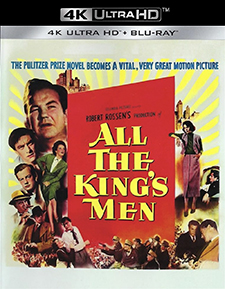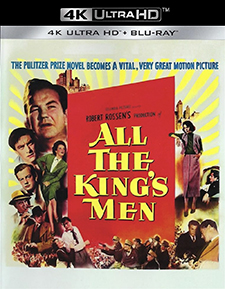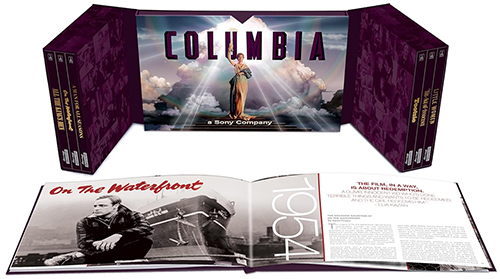All the King's Men: Columbia Classics – Volume 5 (4K UHD Review)

Director
Robert RossenRelease Date(s)
1949 (October 22, 2024)Studio(s)
Columbia Pictures (Sony Pictures Home Entertainment)- Film/Program Grade: A
- Video Grade: A-
- Audio Grade: B
- Extras Grade: B-
Review
[Editor’s Note: Though we’re reviewing the films in the set one by one, All the King's Men is currently only available on physical 4K disc in Sony’s Columbia Classics 4K Ultra HD Collection: Volume 5 box set. It’s available on Amazon by clicking here, or on any of the artwork pictured in this review.]
Some classics remain timeless throughout the decades despite the fact that certain elements within them have dated badly, while others miraculously seem to become more and more relevant as the years go by. All the King’s Men is a rare example of both; it’s a story that was inspired by forgotten events that occurred nearly a century ago in American politics, and yet the warnings that it offers have (sadly) never gone out of style. It’s a film about a specific era, made shortly after that era had ended, that manages to transcend that specific context and remain applicable to just about any era in American politics. Yet it’s still worth considering the real man who inspired the fictional Willie Stark in All The King’s Men: Huey P. Long. Long’s name may not be widely remembered today (outside of certain circles in Louisiana, anyway), but he was an important figure on the American political scene—albeit for all the wrong reasons.
Long was a populist demagogue who exploited the Depression-era economic anxiety of the working class in his rise to power, becoming the governor of Louisiana in 1928. There, he proved to be a callous authoritarian figure who never lost his populist appeal no matter what kinds of corrupt activities that he engaged in (or how many different affairs that he had). When the Louisiana House of Representatives held a vote to impeach him, it led to violence on the floor of the House, although the impeachment did go ultimately go through. Long held rallies to fire up his base and managed to strongarm enough key members of the Senate that they never even held a trial on the House’s charges, which led to him doubling down on his ruthless control of the Louisiana political scene. He successfully ran for the U.S. Senate in 1932 and was considering a run against Franklin D. Roosevelt in 1936 for the Presidency of the United States, but he was assassinated on September 8, 1935 while he was at the Louisiana State Capitol in support of a bill that gerrymandered the district of one of his political opponents.
Long was a divisive figure who was much loved and much derided, in roughly equal measures. It’s not surprising that his story would eventually reach the screen in one form or another, but the path to get there was a circuitous one that ultimately benefited the final film. Poet and author Robert Penn Warren used Long as the inspiration for the character of Willie Stark in his 1946 novel All The King’s Men, which followed the broad strokes of Long’s career while fictionalizing the characters and many of the specific details. Warren publicly distanced himself from Long, but there’s little doubt who he had in mind—the title of the book offers not just an allusion to Humpty Dumpty, but also to the fact that Long was nicknamed “Kingfish” and his motto had been “Every Man a King.” The novel was an immediate success and went on to win the Pulitzer Prize for Fiction in 1947. It was inevitable that a cinematic adaptation would follow, and it did so in short order.
The task of adapting All the King’s Men to the screen fell to writer/director Robert Rossen, ironically enough while working for a ruthless mogul of his own in the form of Harry Cohn at Columbia Pictures. While the project was initiated with another writer, Rossen received sole credit for the final screenplay (and given how dismissive that the Writer’s Guild has always been about directors contributing to a script, the evidence must have been indisputable that Rossen did the bulk of the work). Rossen followed Warren’s lead in keeping the context of the story as nebulous as possible, setting it in the deep South but never identifying the state or even the year in which it takes place. The allusions to Long would have been unmistakable to audiences in 1949, and yet vague nature of Rossen’s setting is what has allowed All the King’s Men to continue to feel germane in the decades that have followed.
Rossen found his ideal Willie Stark in the form of Broderick Crawford, and surrounded him with an outstanding supporting cast. John Ireland plays Jack Burden, the reporter who first brings Stark to the public’s attention and then finds himself floating down a river of corruption alongside the ambitious politician. Mercedes McCambridge is Sadie Burke, a political operative who was first installed in Stark’s campaign in order to manipulate him for the benefit of a rival politician, but she ends up heeding Stark’s siren call as well. Joanna Dru is Ann Stanton, torn between her former boyfriend Burden and her attraction to the profligate Stark. Shepperd Strudwick plays Adam Stanton, Ann’s brother who gets caught up in Stark’s machinations against their father, Judge Monte Stanton (Raymond Greenleaf). The rest of the capable cast includes familiar faces like John Derek, Ralph Dumke, Anne Seymour, Walter Burke, and Paul Ford. Yet All The King’s Men undeniably belongs to Crawford, Ireland, and McCambridge, and unsurprisingly, both Crawford and McCambridge ended up taking home Oscars at the 1950 Academy Awards.
Rossen won an Oscar for the film as well, though as producer, not director. Regardless, his vision for All the King’s Men offers a timeless critique of the corruption that’s inherent to American politics. Stark begins his journey as a genuinely honest outsider who doesn’t even realize that his gubernatorial campaign has been manufactured as a spoiler in order to benefit the other party. His initial failed candidacy teaches him a hard lesson about political life, and he ends up embracing the reality of what it takes to get ahead in the game. He ran as an outsider opposed to the establishment, while unknowingly being a spoiler for that establishment, and eventually becomes an establishment figure of his own. Instead of clearing up corruption, he ends up perfecting it, draining the swampland of the Southern political scene only to refill it to the brim with his own cronies. Those who were trying to use him end up being used by him, and as a result, this one-time outsider becomes the ultimate insider.
In Rossen’s hands, Stark’s story becomes a Tragedy in the classic Aristotelean sense of the term: he’s a potentially great man whose fortunes change from good to bad due to his own hubris. Stark’s fatal flaw is that he ends up believing his own press. All The King’s Men serves as a vivid reminder that we don’t just need to remain vigilant about what our representatives are doing in our names; we also need to remain vigilant about ourselves. Corruption flows downhill, and we can easily end up getting swept away by it.
Cinematographer Burnett Guffey shot All the King’s Men on 35mm film using spherical lenses, framed at the full Academy aperture of 1.37:1 for its theatrical release. As Grover Crisp explains in his detailed restoration notes, the original camera negative was no longer available when the film was restored photochemically back in the late Nineties. A fine-grain master positive struck from the negative was the best remaining element, but damaged or missing sections had to be replaced with other dupe materials. When the film was restored digitally in 2023, that was still the best available element, although a newly discovered dupe negative was used for the missing sections instead. 4K scanning and cleanup was completed at Cineric in New York, while grading for High Dynamic Range (in both Dolby Vision and HDR10) was performed at Motion Picture Imaging in Burbank.
Camera negative or not, the benefits of all this work are immediately obvious. The Columbia Pictures logo is beautifully crisp (no pun intended), and once the optically printed dupes for the opening title sequence are done, it only gets crisper, starting with the detail on the weave of John Ireland’s suit in the first shot of the film. The rest of the optical work like dissolves do tend to stand out since they’re another generation removed from the camera negative, but everything else displays as much detail as the interpositive would allow. The grain is refined but never unnaturally sharp (that’s an inadvertent benefit of not using the OCN), while the grayscale, contrast, and black levels are all top-notch. All the King’s Men will never look better than it does here.
Primary audio is in English 2.0 mono DTS-HD Master Audio. Chace Audio handled the previous audio restoration for All the King’s Men, and their work formed the basis for a new restoration that was completed at Deluxe Audio in Burbank. Noise, hiss, and any other artifacts are at a minimum, while the dialogue remains clean and clear. Louis Gruenberg’s fine score is somewhat limited by the fidelity of the original recordings, but it still has a decent amount of depth thanks to the restoration work.
Additional audio options include French, German, Italian, Spanish (Spain) and Spanish (Latin America) 2.0 mono DTS-HD Master Audio. Subtitles include English, English SDH, Arabic, Chinese (traditional), Danish, Dutch, Finnish, French, German, Italian, Korean, Norwegian, Portuguese, Spanish (Spain), and Spanish (Latin America).
Sony’s 4K release of All the King’s Men is the first film in their Columbia Classics 4K Ultra HD Collection: Volume 5. The set also includes On the Waterfront, A Man for All Seasons, Tootsie, The Age of Innocence, and Little Women, plus a bonus UHD with the following silent films: The Price She Paid, Ladies of Leisure, The Belle of Broadway, The Desert Bride, and The Scarlet Lady. The packaging is similar to the other four volumes, with two wings that open up, each of which houses three films in individual Amaray cases with slipcovers. (The inserts use the original theatrical poster artwork, while the slipcovers offer new artwork.) At the back of the box is a separate compartment that houses a hardbound book featuring essays on each film by different authors (Scott Tobias, in this case) as well as individual restoration notes by Grover Crisp, plus notes on the audio remixes where appropriate.
Each of the films in the collection includes a Blu-ray with a 1080p copy of the film, all of them based on the same 4K masters as the UHDs. There’s also a paper insert tucked inside with Digital Codes for each film. There are no extras on the UHD with the feature film, but the following extras are included on the Blu-ray only, in HD:
- Audio Commentary with Julie Kirgo and Peter Hankoff
- Force of Will: The Making of All the King’s Men (25:40)
- Theatrical Trailer (2:37)
The new commentary pairs writer and historian Julie Kirgo with filmmaker/author (and self-professed troublemaker) Peter Hankoff. They provide some context on where All the King’s Men fell into both Rossen’s career and history of Columbia Pictures, as well as details about the making of the film. They analyze the unspecified Depression-era setting (it seems to be pre-war, and the cars that are visible could place it in the Thirties) and dig deep into the contributions of the various cast members, especially Ireland, McCambridge, and Crawford. They also note some of the differences between Robert Penn Warren’s novel and the film. When analyzing the themes of the film, they don’t necessarily agree with each other at all times—at one point, Kirgo says that she’s going to have to mull over something that the troublemaker said (although she comes around eventually). That kind of give and take makes this commentary an interesting one.
Force of Will is a new documentary about the making of the film, featuring interviews with Joe Saltzman, Alan K. Rode, and Julie Kirgo. They explain how Rossen was a staunch union advocate who had naturally joined the American communist party, although he was happy leave the party in order adapt All the King’s Men for Harry Cohn at Columbia. They offer plenty of information about the production of the film from casting to production and post-production, as well as what happened afterward. Rossen shot as much on location as he could, with real people serving as background extras, so the weatherbeaten faces on screen are as authentic as possible. Rossen shot so much footage that editing was a challenging process, with Cohn finally issuing an ultimatum to get them to whittle everything down once and for all. That did the trick and the results led to Oscars for Rossen, Crawford, and McCambridge (Force of Will includes footage of them accepting their awards). Saltzman, Rode, and Kirgo also cover the unfortunate postscript to Rossen’s success when he ultimately named names before HUAC in order to keep working in Hollywood (a subject that we cover in our review of Rossen’s 1959 film They Came to Cordura).
The only thing that’s missing here from previous releases is the isolated score track that was on the 2014 Blu-ray from Twilight Time. That disc also included invaluable liner notes from Julie Kirgo, but her repeated presence on this one more than makes up for it. The all-new extras may not be extensive, but one good commentary track and a making-of documentary are more than adequate. All the King’s Men stands well enough on its own, but these extras are sufficient to enhance anyone’s appreciation of it. For now, it’s only available as a part of Sony’s Columbia Classics 4K Ultra HD Collection: Volume 5, which may be a bone of contention for some people who are interested in some but not all of the titles that it includes. Everyone’s mileage will vary on that score, but Volume 5 offers a potent collection of classic films that’s hard to resist even if one or more of them may not be to your tastes. The first three alone are worth the price of admission for the whole set. As a result, it’s highly, highly recommended.
- Stephen Bjork
(You can follow Stephen on social media at these links: Twitter, Facebook, and Letterboxd).


